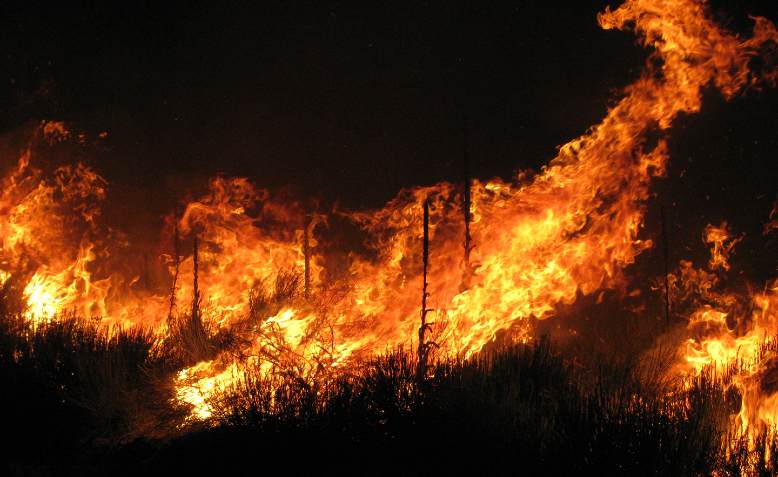 Wild Horse Fire. Photo: Kaibab National Forest / CC BY-SA 2.0, license linked below article
Wild Horse Fire. Photo: Kaibab National Forest / CC BY-SA 2.0, license linked below article
As we face another heatwave, Elaine Graham-Leigh looks at what’s at stake and the urgent course of action we need
If anyone was in any doubt that climate change means deep crisis, this summer’s heatwave should have dispelled those illusions. Our high-temperature future doesn’t mean more basking on the beach, it means fires, infrastructure breakdowns, chaos and people dying. It’s a particularly frightening situation because we’re seeing these effects on a much faster timetable than climate scientists had been predicting. We’re still only at 1.2oC of warming over pre-industrial levels. The agreements at the COP26 summit last year put us on course for 2.7oC.
It is clear that we are going to need to adapt very quickly to the warming world. It’s equally clear that the adaptations we need are collective ones; we’re not going to get them on an individualistic basis from the private sector. We’re going to need more funding for the fire service to deal with the increased risk of wildfires. There’s a huge infrastructure job to be done on the railways, so that the trains can still run at higher temperatures. There’s adapting our water infrastructure to deal with drought, particularly in the south and east. Then there’s the need to organise insulation and cooling for all sorts of public buildings, as well as people’s homes.
All of these will require reversing decades of cuts to public services. For industries like rail and water, they also emphasise the already strong case for nationalisation, so that the money needed for these essential works isn’t diverted any longer into shareholders’ pockets. They aren’t going to be put in place by a Tory government, or indeed if Rachel Reeves, the current shadow chancellor, is to be believed, a Labour government. If we recognise the need to adapt our communities and our infrastructure to the climate we have and the climate we’re facing, we are going to have to fight for it.
The urgent need for adaptations to help us survive the warming we have does not however obviate the need to reduce emissions. It is true that we are locked in to increasing warming because of the greenhouse gases that have already been emitted, but that does not mean that there is no point in cutting future emissions. However bad things are going to get, increasing emissions will make them still worse. While climate scientists are divided on this, there have been some indications that climate systems may respond more quickly than was sometimes thought to reductions in emissions. We can still improve our future by cutting greenhouse gases.
The significant cuts we need require government action: we need to build renewable energy infrastructure, shift people and freight off the roads and onto electrified rail and other public transport, implement green heating solutions that work for every home, and so on. The signals from Liz Truss and Rishi Sunak’s Tory leadership campaigns are, however, that the climate crisis is unimportant. They spent only two minutes on it in the televised debate at the end of July, and that was to discuss what individuals could do in their own lives, not what the government should be doing. This puts them behind even most Tory members, who are at least able to recognise that more days like the UK’s first 40oC day are not in their interests. It seems clear that whoever wins the leadership contest, what we’ll get, at best, is a lukewarm commitment to net zero by 2050 and no actual action.
As we face a generational attack on our standard of living with the cost-of-living crisis, there can be a tendency in some quarters to see action on the climate crisis either as a luxury we can’t afford or as a direct attack on working people. Thus, one of the few things Liz Truss has said about the climate has been to propose scrapping the green levy on energy bills. We must recognise, though, that the continuing lack of action to reduce emissions and to adapt to the new climate conditions is itself an attack on all of us. It is another way in which the government, and the ruling class in general, has shown itself utterly unable to act to meet our basic need for a liveable climate.
We’re heading into an autumn of struggle over pay and conditions, inflation, energy bills and the rest, the like of which many of us will not have seen in our lifetimes. As trade unionists and climate campaigners demonstrated together in Glasgow around COP26, the fight for urgent action on the climate crisis is part of that wider struggle. The fight for public services and nationalisation dovetails with what we need the state to do about the climate crisis, so trade unions are crucial to the mass movements we need to force any government to take the necessary steps to decarbonise and adapt. Building those movements is something of which everyone spurred into action by our apocalyptic summer needs to be a part.
Before you go
Counterfire is growing faster than ever before
We need to raise £20,000 as we are having to expand operations. We are moving to a bigger, better central office, upping our print run and distribution, buying a new printer, new computers and employing more staff.

